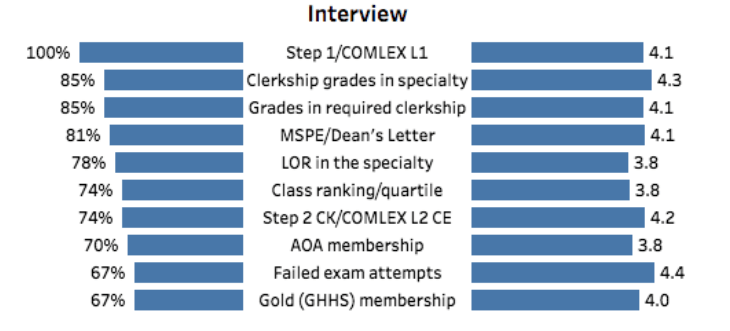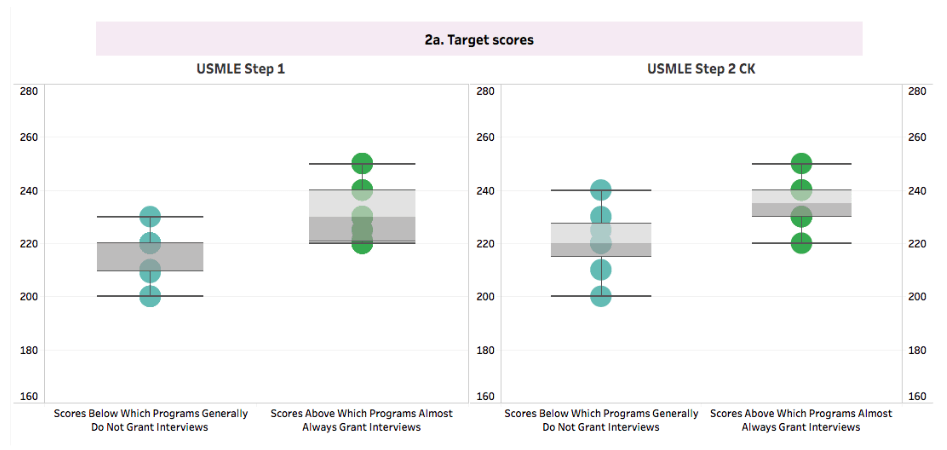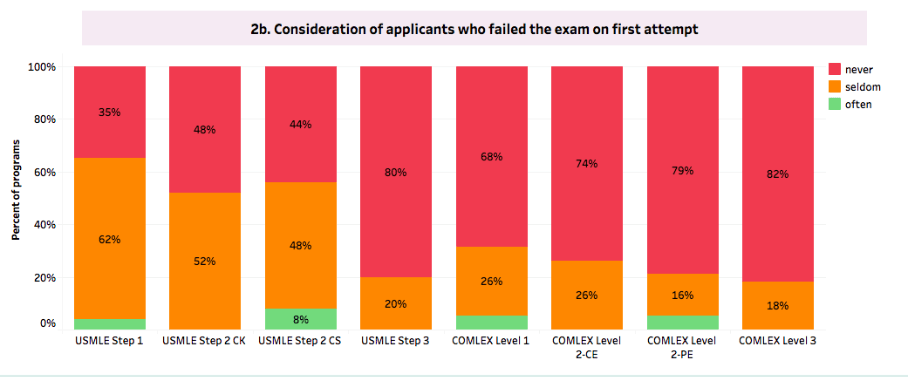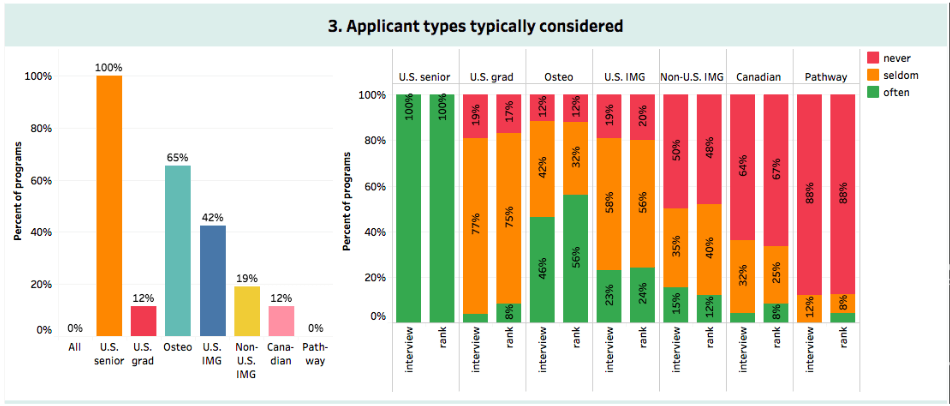What You Need to Match Into MED/PEDS for Residency

10538 Views
How to Match into a Combined Internal Medicine & Pediatrics (MED/PEDS) Residency Program
Residency application season is fast approaching and today we’re looking at what it takes to match into MED/PEDS for residency! The NRMP conducted a survey to determine what factors Program Directors consider when deciding which candidates to interview and rank for their residency program. The results were compiled into a “at a glance” tool, which is extremely helpful in gauging where your application packet stands compared to the applicant pool, and whether adding additional components, like a letter of recommendation (LOR) in the specialty, could give you a leg up as programs review your application.
The interactive table-au tool can be found here, and we recommend taking a look at the specialty you’ll be applying to before submitting your ERAS packet: https://public.tableau.com/profile/national.resident.matching.program#!/vizhome/PDSurvey_0/Desktoptablet
For Med/Peds specifically, major components of the survey you should pay attention to include: (from top to bottom of the page):
- Selection Criteria for an Interview – For Med/Peds, step 1 scores and clerkship grades are most important. Because this residency is in fact two residencies, program directors want to see that you are able to keep up academically in two very large fields. This is even more important considering how small each residency class is, typically between 3-6 spots. Because getting a letter from Med/Peds faculty is not always possible depending on your institution (where Med/Peds faculty may not be available), it is ranked lower than more “objective” data (although, as we know too well, clerkship grades sometimes feel anything besides objective).
-
Step 1 and Step 2 Scores:
- Step 1 – Score
-
-
- 220+ looks like a solid score in Med/Peds, with the median being 230 for those who are offered interviews.
- Programs do NOT typically offer interviews in the 200-210 range. If you’re below 210, we suggest having a back-up specialty you could consider.
- Programs do typically offer interviews: 220+ seems to be the range at which you can feel comfortable in being offered interviews by a decent number of programs. If you’re in the 240+ range, you can likely be selective about where you apply.
- If you failed USMLE Step 1 follow these steps.
-
- Step 2CK – Score
-
-
- 220 seems to be the minimum threshold at which programs will grant interviews
- Scores below 210-215 generally will place you in a unfavorable position to receive an interview
-
- Step 2CK – Timing of Taking the Exam
- Only 46% of programs required at least passing CK, although we do expect this number to grow. You can wait to take Step 2CK until after you have submitted ERAS.
- Failing Step 1 is not an automatic no-go:
-
- Failing Step 1 is a BIG deal in ANY specialty, however Med/Peds does have a tiny bit of wiggle room than in other more competitive fields such as ENT and Dermatology. 35% of Med/Peds programs will NOT consider you if you’ve failed Step 1, and 48% will NOT consider you if you’ve failed Step 2. So, if you’ve failed an exam, you can still apply, but you should apply to a BIG number (40+) of programs. 62% and 52% of programs seldom consider applicants who have failed Step 1 and Step 2, respectively.
-
Types of Applicants Considered:
-
- International Grads (U.S. and non-U.S.) are more likely to have difficulty matching into Med/Peds, although it’s not impossible:
- 23% of programs report they often interview US IMG students and 15% report they often interview non-US IMGs. Around 20% of programs will not consider US IMGs, and 50% will not consider Non-US IMGs. We recommend doing your homework to determine which programs may be more likely to consider IMGs, and preferentially contact and rank these programs.
- Osteopathic graduates have a good shot matching into Med/Peds:
- Around 50% of programs will routinely interview and rank DO applicants. Around 12% of programs will never interview or rank a DO applicant. With the remaining 32-42 % that seldom consider DO applicants, it is very important to do your research to identify these programs so that you can best increase your chances of matching.
- Interviewees Get Ranked!: If you get an interview invitation, you are very likely to end up on the rank list if you interview (on average, programs ranked 64 of 66 applicants interviewed, around 97%!). We recommend ranking at least 10 programs, so once you receive 11 interview invitations, you can feel okay with starting to prioritize and cancel as more come in given you are likely to get ranked.
- Expect to receive interview invitations in September and October: Med/peds is more front-loaded on interview invitations than other programs. 35% will be sent in the last two weeks of September, and 52% of interview invitations will be sent out during October. A few are sent in November, and almost none in December or January.
- Expect to interview November – January Only 11% of interviews will occur before November, which gives you ample time to prepare. Around 75% of all interviews are conducted in November and December. For further discussion on how to prep for your interview, see our blog post on how to Crush your Residency Interview: https://elitemedicalprep.com/preparing-for-your-residency-interview/
After you’ve browsed your specialty, take a look at a few other specialties and note what’s NOT important for Med/Peds:
- Step 2 isn’t particularly important in Med/Peds
- Class ranking/quartile isn’t as important in Med/Peds as in other specialties
Summary for Med/Peds Residency Applicants
- Goal Step 1 scores are above 220, and goal Step 2 scores are above 230. LORs from Med/Peds faculty are not as important, although you should obtain letters from faculty on either side.
- IMGs and DO candidates may have a better shot in Med/Peds than other sub-specialties. However, Med/Peds programs are often very small (with around 4 slots for residents each year), so there may be a stronger preference for US grads compared to Internal Medicine and Family Medicine.
- Expect interview invites on the earlier side in September and October. If you have not heard from a program you are very interested in by the end of October, you should definitely reach out to the program to let them you how interested you are (and why!).
If you need further or specialized assistance understanding which residency specialties you are best suited to apply to, you can contact us or visit our residency advising page to learn more about how Elite Medical Prep residency advising services.
Featured Articles






